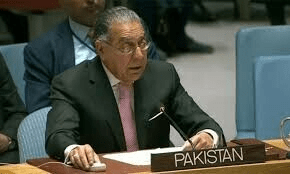ISLAMABAD: Renowned lawyer and human rights activist Asma Jahangir on Friday said a large number of women faced harassment at their workplaces in the country.
“Even judges stare at young women lawyers and talk with them irrelevantly. So many times during hearings I had to request the judges to listen to me rather than looking at the young lawyers.”
Ms Jahangir was speaking to the participants of an event organised by the Sustainable Development Policy Institute (SDPI) in connection with the International Women’s Day on Friday.
She said though the Protection against Harassment of Women at Workplace Bill 2010 was a positive step, a large number of women were still facing difficulties.
The struggle initiated by women has brought changes to the controversial laws like the Hudood Ordinance, she added.
Talking about “honour killing”, she said it did take place mostly in Muslim countries such as Pakistan, Jordan, Yemen and Turkey. Judicial bias and gender discrimination pose constant threat to women in Pakistan.
Making legislation is not simple but its implementation required a proper mechanism and institutional reforms as well.
“We have the tendency of over-legislation regarding women. So many things have been overlapped because of it. Some non-governmental organisations who even do not have a lawyer at their panel have been proposing legislation,” she said.
Ms Jahangir showed concerns over Talibanisation, sectarian conflicts and constitutional violations in Pakistan. “Pakistani women are facing challenges because of Talibanisation of minds,” she added.
“Every religion curbs women rights to some extent. Some countries acted against religions and put a ban on wearing hijab which was also a violation of human rights.”
She added: “I believe that nowadays human rights are more important than anything else. It is a binding force between people and the state. If state protects the rights of people, they start respecting the state,” she said.
Ms Jahangir said in 1980 she and her sister Hina Jilani formed the first law firm established by women in Pakistan which provided legal services to several women and members of the minority groups.
“My family has equally suffered abductions, attacks and life threats, but I have continued my struggle for justice,” she said.
In reply to questions from the participants, Ms Jahangir said the state had no right to declare faith of the people.
She also said every politician should be accountable.











































